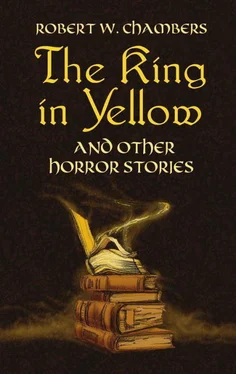“I think,” said Hastings quietly, “that he does shoot fairly—yes, and even gives one warning.”
“Is it your experience, Monsieur Hastings?”
He looked straight into her eyes and said, “He is warning me.”
“Heed the warning then,” she cried, with a nervous laugh. As she spoke she stripped off her gloves, and then carefully proceeded to draw them on again. When this was accomplished she glanced at the Palace clock, saying, “Oh, dear, how late it is!” furled her umbrella then unfurled it, and finally looked at him.
“No,” he said, “I shall not heed his warning.”
“Oh, dear,” she sighed again, “still talking about that tiresome statue!” Then stealing a glance at his face, “I suppose—I suppose you are in love.”
“I don’t know,” he muttered, “I suppose I am.”
She raised her head with a quick gesture. “You seem delighted at this idea,” she said, but bit her lip and trembled as his eyes met hers. Then sudden fear came over her and she sprang up, staring into the gathering shadows.
“Are you cold?” he said, but she only answered, “Oh, dear, oh, dear, it is late—so late. I must go—good-night.”
She gave him her gloved hand a moment and then withdrew it with a start.
“What is it?” he insisted, “are you frightened?”
She looked at him strangely.
“No—no—not frightened,—you are very good to me——”
“By Jove!” he burst out, “what do you mean by saying I’m good to you! That’s at least the third time, and I don’t understand!”
The sound of a drum from the guard-house at the palace cut him short. “Listen,” she whispered, “they are going to close. It’s late, oh, so late!”
The rolling of the drum came nearer and nearer, and then the silhouette of the drummer cut the sky above the eastern terrace. The fading light lingered a moment on his belt and bayonet, then he passed into the shadows, drumming the echoes awake. The roll became fainter along the eastern terrace, then grew and grew and rattled with increasing sharpness when he passed the avenue by the bronze lion and turned down the western terrace walk. Louder and louder the drum sounded and the echoes struck back the notes from the gray palace wall; and now the drummer loomed up before them—his red trousers a dull spot in the gathering gloom, the brass of his drum and bayonet touched on his shoulders. He passed, leaving the crash of the drum in their ears, and far into the alley of trees they saw his little tin cup shining on his haversack. Then the sentinels began the monotonous cry: “on ferme! on ferme!” and the bugle blew from the barracks in the rue de Tournon.
“On ferme! on ferme!”
“Good-night,” she whispered, “I must return alone tonight.”
He watched her until she reached the northern terrace, and then sat down on the marble seat until a hand on his shoulder and a glimmer of bayonets warned him away.
She passed on through the grove, and turning into the rue de Medici, traversed it to the Boulevard. At the corner she bought a bunch of violets and walked on along the Boulevard to the rue des Ecoles. A cab was drawn up before Boulant’s and a pretty girl aided by Elliot jumped out.
“Valentine!” cried the girl, “come with us!”
“I can’t,” she said, stopping a moment—“I have a rendezvous at Mignon’s.”
“Not Victor?” cried the girl laughing, but she passed with a little shiver, nodding good-night, then turning into the Boulevard St. Germain, she walked a little faster to escape a gay party sitting before the Café Cluny who called to her to join them. At the door of the Restaurant Mignon stood a coal-black negro in buttons. He took off his peaked cap as she mounted the carpeted stairs.
“Send Eugene to me,” she said at the office, and passing through the hallway to the right of the dining-room stopped before a row of panelled doors. A saiter passed and she repeated her demand for Eugene, who presently appeared, noiselessly skipping, and bowed murmuring, “Madame.”
“Who is here?”
“No one in the cabinets, madame; in the hall Madame Madelon and Monsieur Gay, Monsieur de Clamart, Monsieur Clisson, Monsieur Marie and their set.” Then he looked around and bowing again murmured. “Monsieur awaits Madame since half an hour,” and he knocked at one of the panelled doors bearing the number six.
Clifford opened the door and the girl entered.
The garçon bowed her in and whispering, “will Monsieur have the goodness to ring,” vanished.
He helped her off with her jacket and took her hat and umbrella. When she was seated at the little table with Clifford opposite, she smiled and leaned forward on both elbows looking him in the face.
“What are you doing here?” she demanded.
“Waiting,” he replied, in accents of adoration.
For an instant she turned and examined herself in the glass. The wide blue eyes, the curling hair, the straight nose and short curled lip flashed in the mirror an instant only, and then, its depths reflected her pretty neck and back. “Thus do I turn my back on vanity,” she said, and then leaning forward again, “what are you doing here?”
“Waiting for you,” repeated Clifford, slightly troubled.
“And Cécile.”
“Now don’t, Valentine——”
“Do you know,” she said calmly, “I dislike your conduct?”
He was a little disconcerted, and rang for Eugene to cover his confusion.
The soup was bisque, and the wine Pommery, and the courses followed each other with the usual regularity until Eugene brought coffee, and there was nothing left on the table but a small silver lamp.
“Valentine,” said Clifford, after having obtained permission to smoke, “is it the Vaudeville or the Eldorado—or both, or the Nouveau Cirque, or——”
“It is here,” said Valentine.
“Well,” he said, greatly flattered, “I’m afraid I couldn’t amuse you——”
“Oh, yes, you are funnier than the Eldorado.”
“Now see here, don’t guy me, Valentine. You always do, and, and,—you know what they say,—a good laugh kills——”
“What?”
“Er—er—love and all that.”
She laughed until her eyes were moist with tears. “Tiens,” she cried, “he is dead, then!”
Clifford eyed her with growing alarm.
“Do you know why I came?” she said.
“No,” he replied uneasily, “I don’t.”
“How long have you made love to me?”
“Well,” he admitted, somewhat startled,— “I should say,—for about a year.
“It is a year, I think. Are you not tired?”
He did not answer.
“Don’t you know that I like you too well to—to ever fall in love with you?” she said. “Don’t you know that we are too good comrades,—too old friends for that? And were we not,—do you think that I do not know your history, Monsieur Clifford?”
“Don’t be,—don’t be so sarcastic,” he urged, “don’t be unkind, Valentine.”
“I’m not. I’m kind. I’m very kind,—to you and to Cécile.”
“Cécile is tired of me.”
“I hope she is,” said the girl, “for she deserves a better fate. Tiens, do you know your reputation in the Quarter? Of the inconstant, the most inconstant,—utterly incorrigible and no more serious than a goat on a summer night. Poor Cécile!”
Clifford looked so uncomfortable that she spoke more kindly.
“I like you. You know that. Everybody does. You are a spoiled child here. Everything is permitted you and every one makes allowance, but every one cannot be a victim to caprice.”
“Caprice!” he cried. “By Jove, if the girls of the Latin Quarter are not capricious——”
“Never mind,—never mind about that! You must not sit in judgment—you of all men. Why are you here to-night? Oh,” she cried, “I will tell you why! Monsieur receives a little note; he sends a little answer; he dresses in his conquering raiment——”
Читать дальше












